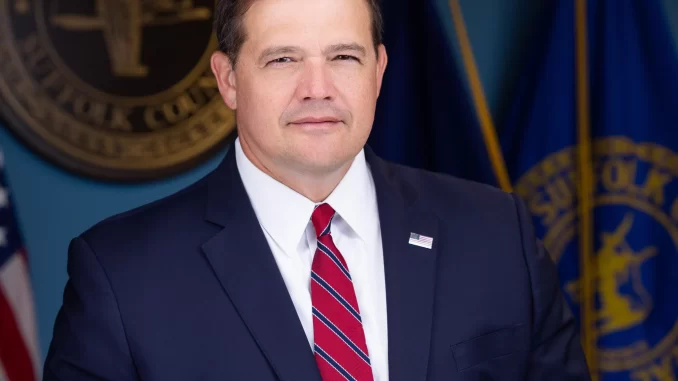
Question: Should a district attorney take campaign contributions from the union for a police department that he or she oversees?
Current Suffolk County District Attorney Ray Tierney is the first district attorney to our knowledge to actually question the propriety of this glaring conflict of interest.
The issue was brought to the fore by Suffolk County Legislator Rob Trotta, a reformer who once served as a Suffolk police detective himself, and worked with the district attorney’s gang task force.
Many believe that county unions, especially the law enforcement unions, have far too much influence over elected officials who negotiate their contracts, and provide oversight over their departments.
Trotta sought an opinion from the Suffolk County Ethics Commission as to whether campaign donations from a police union could rightfully be accepted by a district attorney, who is supposed to be a check and balance of the very important law-enforcement branch.
Surprisingly, and we think correctly, the Ethics Commission determined that the acceptance of said donations creates an untenable conflict of interest that should not be permitted.
Tierney has, to his credit, already been debating whether he should accept any such donations or return them all, as he had returned some in the past.
Unfortunately, it looks like the Ethics Commission caved to the pressure and did an about-face and disappointingly claimed that they would put their decision on hold unless they received cover from the state Ethics Commission, which is unlikely to make the same bold decision that Suffolk’s commission did.
Don’t hold your breath waiting for the state commission to ban this glaring conflict of interest.
Since the county commission weaseled out of its earlier decision, it’s now left to the district attorney himself to determine if he will keep the funds. We hope he sets the right tone for this by sending those donations back.
Let’s be clear that there is nothing illegal or unethical for legislators, district attorneys, or other elected officials from having accepted the union donations. This is the present law and they are simply following the rules.
It’s not fair to ask one incumbent or candidate to unilaterally disarm in seeking donations when his or her opposition is free to accept them. Yet, officials are to blame for allowing this terrible system to persist for so many decades.
These glaring conflicts of interest do not just pertain to the district attorney and unions. What about district attorneys accepting money from criminal defense lawyers, with whom they cut plea deals every day?
And what about county officials accepting donations from the municipal unions whose contracts they negotiate? What about school board members taking money from teachers unions or town supervisors taking money from their unions?
In the private sector, if the management team accepts money from the union sitting across the table during the negotiations, they would be put in jail. Yet, in the public sector, the acceptance of such money is perfectly acceptable. But should it be?
Efforts to try to ban these donations in the past have gone nowhere. Incumbents on both sides of the aisle benefit the most from the flow of this union money, so they don’t want to rock the boat.
But it’s high time we get enough reformers who will do the right thing and ban these conflicts. Note that no less than liberal President Franklin Roosevelt and vaunted labor leader Samuel Gompers believed municipal unions create such a conflict with their donations.
We recommend checking out a book called Not Accountable by Philip Howard. A constitutional scholar, Howard suggests that this inherent conflict of interest between public unions and the donations they give to public officials violates various constitutional provisions.
We think he’s right, but it will take an eternity before the courts ever decide definitively on this issue. In the meantime, we’re happy to see there’s one official standing tall, trying to set the precedent. We hope Tierney will return this money and that others will follow.

